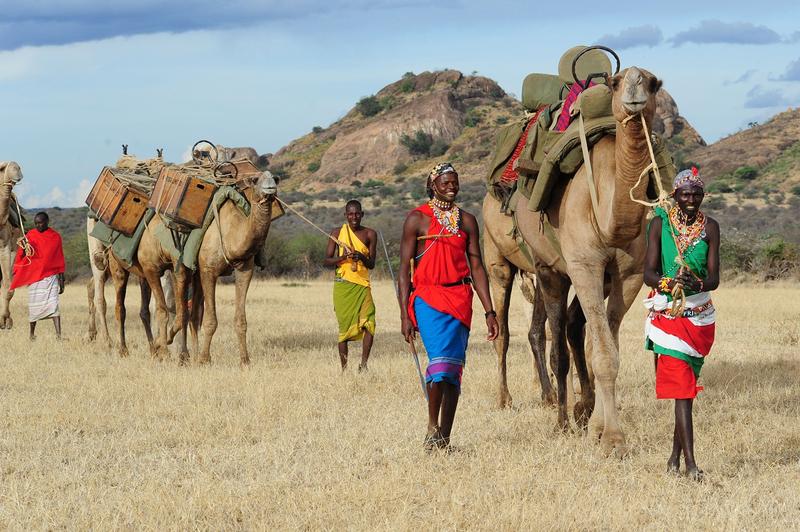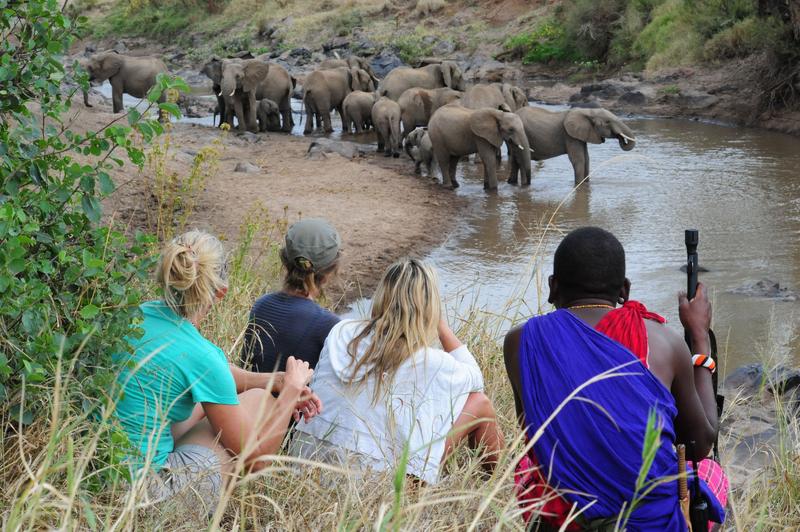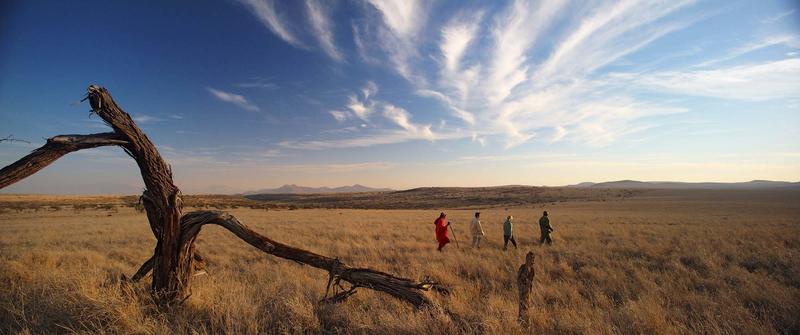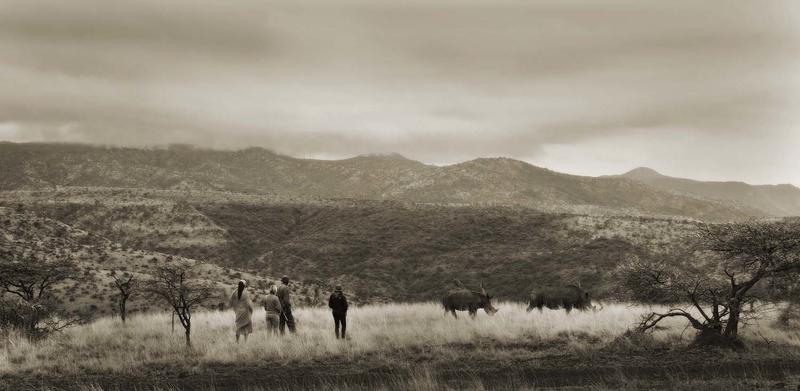Increasingly popular safaris on foot offer African experience on the ground
 Camels accompanied by the Karisia Walking Safaris team carry luggage from one camp to the next. (PHOTO PROVIDED TO CHINA DAILY)
Camels accompanied by the Karisia Walking Safaris team carry luggage from one camp to the next. (PHOTO PROVIDED TO CHINA DAILY)
Driving may be the only option for many tourists visiting most of the national parks and reserves in Kenya, but some of the African conservancies as well as its older, established private ranches offer exciting walking safaris.
The walks can give visitors the experience of a lifetime — immersing in nature without distractions from the sounds of engines, getting an authentic insight into the land, learning about animal behavior on the ground and noticing small details that would have been overlooked on game drives.
James Christian, the director of Karisia Walking Safaris, said the adventurous activity is gaining popularity in Kenya as it allows travelers to enjoy a more intimate experience of the country's animals and its people.
"Visitors cannot truly get to know a place until they walk and interact with that place. Even large cities are impossible to get to know by simply seeing them from a vehicle. Walking allows visitors to feel Africa; to smell, touch and experience Africa firsthand," he said.
Charl Grobler, the guide and activities manager at Elewana Collection, a tourism agency in Kenya, said the biggest misconception about walking safaris is that it is a hike.
"It is a walk and generally you do not cover much ground, on average only a few miles. The aim is to see the small things — tracks, signs, dung and insects, among others," he said.
"Generally, it isn't great for photography and I always ask guests to leave their big cameras at home. You do not get close enough for wildlife photography and most phones can take great scenic photos."
 Moi Kechine (right), a Karisia Walking Safaris guide, shows guests a herd of elephants crossing the Ewaso Nyiro River, moving from Tumaren Ranch to Mpala Ranch, in Kenya's Laikipia county. (PHOTO PROVIDED TO CHINA DAILY)
Moi Kechine (right), a Karisia Walking Safaris guide, shows guests a herd of elephants crossing the Ewaso Nyiro River, moving from Tumaren Ranch to Mpala Ranch, in Kenya's Laikipia county. (PHOTO PROVIDED TO CHINA DAILY)
Grobler said October to December is the most scenic and beautiful time to explore East Africa on foot as the season has sporadic rains, and the grasslands are green and the animals are fat and healthy.
His company offers walking safaris in 13 of its collection of 16 lodges, camps and hotels spread across Kenya and Tanzania.
He said Lewa Wildlife Conservancy, located in northern Kenya, and where the company operates its Lewa Safari Camp, is one of the best places in Africa to track black and white rhinos on foot.
Grobler said safari walks take one or two hours because it gets hot quickly in most of the areas where they offer the service. "We depart early mornings or late afternoons when it's cooler," he said.
"What most guests don't realize is that the guide and ranger are continuously looking out for potentially dangerous animals. It takes great concentration, and we recommend a maximum time of two hours for the guides' and rangers' sake as well."
To ensure tourists' safety during the walking safaris, Grobler said all guides are professionals and highly experienced. The company also has walking and rifle training workshops throughout the year.
He said walking guides in all national parks and conservancies are escorted by an armed ranger or a guide carries a rifle.
"We only take small groups out on walks, with a maximum of six guests and a policy of no guests under 16 years of age," he said.
"Our guides don't take risks and with the network of rangers in the parks, they know which areas are best for walking and understanding wildlife movement. Our guides are all first-aid trained and grew up in the areas that they now guide in."
 People enjoy a bush walk at the Lewa Wildlife Conservancy in northern Kenya. (PHOTO PROVIDED TO CHINA DAILY)
People enjoy a bush walk at the Lewa Wildlife Conservancy in northern Kenya. (PHOTO PROVIDED TO CHINA DAILY)
Fitness, agility needed
Grobler warned that walking safaris are not for everyone, noting that guests need a relative amount of fitness and agility in case of an emergency.
He said that while it is not easy for guides to tell guests that they cannot go on a walking safari, safety remains the company's priority.
"What's important to remember is respect for nature, we never put our guests in harm's way," Grobler said.
"If guests are not suited for walking safaris, we have plenty of other activities for them. All our camps offer alternative activities, such as night game drives, cultural visits, and other fun activities like mountain biking or horse riding."
James Christian from Karisia Walking Safaris said his company, which has been offering walking safaris since 2004, gives tourists an opportunity to explore the bush across Kenya's Laikipia, Isiolo and Samburu counties, in addition to learning the traditional lore of the local communities.
The walk kicks off in the morning after breakfast just as the sun rises. The visitors are accompanied by a guide, a tracker and a few camels carrying refreshments and daypacks.
They then stop en route for a light snack after which they move on to the next camp, where they have lunch.
The rest of the day is usually spent relaxing — enjoying a stream or river and having a siesta or fishing, before going for an evening walk. The camels also use this time to rest and recharge around the camp.
In the evening, visitors are also offered hot showers, then drinks by the fire and a three-course dinner under the stars.
When the visitors set off for the walk in the morning, the Karisia Walking Safaris employees pack up the camp and aim straight for the next campsite.
To ensure the safety of tourists during the walking safari, Christian said the guides carry guns but noted that since they started offering the service, they have never encountered a situation where the firearms had to be used.
They also work with local residents who are familiar with the environment and are used to walking in the bush.
"When you are familiar with wildlife, it's not difficult to walk in their environment in a very safe way," he said, adding, "We are wilderness first-aid trained so we take first aid very seriously."
During the walking safaris, Christian said much of the talking revolves around natural history as well as the culture of the local community.
The Maasai community, part of the inhabitants of Laikipia where Karisia Walking Safaris is based, is famous worldwide for its distinctive culture, rituals, attire and courage.
Maasai make up part of the Karisia Walking Safaris staff members, together with the neighboring Samburu and Turkana people who also have a rich culture.
Christian said each safari is tailor-made to suit the group and the walking distance and duration depend on guests' preference and fitness.
"On average, we walk 12 kilometers from morning to lunchtime. In the afternoon, we can go on a short walk, visit a local manyatta community, do some rock climbing or just relax," he said.
 Visitors watch white rhinos during their safari walk at the Lewa Wildlife Conservancy in northern Kenya. (PHOTO PROVIDED TO CHINA DAILY)
Visitors watch white rhinos during their safari walk at the Lewa Wildlife Conservancy in northern Kenya. (PHOTO PROVIDED TO CHINA DAILY)
'Wild, beautiful setting'
"Our trips are popular with honeymooners as well as family groups or friends wanting a few days together in a wild, beautiful setting. We have had groups of up to 20 people and sometimes a family of four."
Christian said their walking safari packages range from $500 per person per night to over $1,000, depending on the level of accommodation and the number of visitors; the higher the number, the cheaper the cost.
He said Laikipia is a good place for a walking safari because it covers private land.
"In a private park, you can walk with the help of professionals and the people who grew up walking in the bush. There is also freedom to practice conservation in a productive way," he said.
"The ranches in Laikipia are able to work with the local community in a positive way.
"The Maasai communities neighboring Laikipia are able to graze their cattle. It's conservation involving not only wildlife but also ranches and traditions."
Christian said the future of walking safaris in Kenya is very bright, noting that the government is also realizing that the country can have many different kinds of safaris instead of only focusing on the traditional safari via vehicles.
"Many people come to Kenya for different reasons and a walking safari is one of those reasons," he said.


